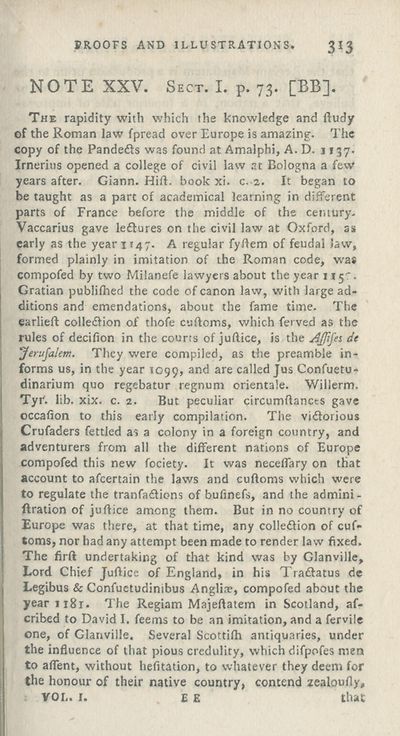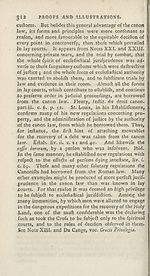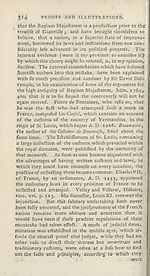Download files
Complete book:
Individual page:
Thumbnail gallery: Grid view | List view

PROOFS AND ILLUSTRATIONS. 313
NOTE XXV. Sect. I. p. 73. [BB].
The rapidity with which the knowledge and ftudy
of the Roman law fpread over Europe is amazing. The
copy of the Pandefts was found at Amalphi, A. D. 1137-
Irnerius opened a college of civil law at Bologna a few
years after. Giann. Hift. book xi. c. 2. It began to
be taught as a part of academical learning in different
parts of France before the middle of the century.
Vaccarius gave leftures on the civil law at Oxford, as
early as the year 1147. A regular fyffem of feudal Jaw,
formed plainly in imitation of the Roman code, was
compofed by two Milanefe lawyers about the year 115''.
Gratian publilhed the code of canon law, with large ad¬
ditions and emendations, about the fame time. The
earlieft colledfion of thofe cuftoms, which ferved as the
rules of decifion in the courts of juftice, is the AJJifts de
Jerujalem. They were compiled, as the preamble in¬
forms us, in the year 1099, and are called Jus Confuetu-
dinarium quo regebatur regnum orientale. Willerm.
Tyf. lib. xix. c. 2. But peculiar circumflancts gave
occafion to this early compilation. The viilorious
Crufaders fettled as a colony in a foreign country, and
adventurers from all the different nations of Europe
compofed this new fociety. It was neceffary on that
account to afeertain the laws and cuftoms which were
to regulate the tranfadlions of bufmefs, and the admini-
ftration of juftice among them. But in no country of
Europe was there, at that time, any colledtion of cuf¬
toms, nor had any attempt been made to render law fixed.
The firft undertaking of that kind was by Glanville,
Lord Chief Juftice of England, in his Tradlatus de
Legibus & Confuetudimbus Angliae, compofed about the
year 1181. The Regiam Majeftatem in Scotland, af-
cribed to David I. feems to be an imitation, and a fervile
one, of Glanville. Several Scottifh antiquaries, under
the influence of that pious credulity, which difpofes men
to affent, without hefitation, to whatever they deem for
the honour of their native country, contend zealoufly,
* VOL. I. £ E that
NOTE XXV. Sect. I. p. 73. [BB].
The rapidity with which the knowledge and ftudy
of the Roman law fpread over Europe is amazing. The
copy of the Pandefts was found at Amalphi, A. D. 1137-
Irnerius opened a college of civil law at Bologna a few
years after. Giann. Hift. book xi. c. 2. It began to
be taught as a part of academical learning in different
parts of France before the middle of the century.
Vaccarius gave leftures on the civil law at Oxford, as
early as the year 1147. A regular fyffem of feudal Jaw,
formed plainly in imitation of the Roman code, was
compofed by two Milanefe lawyers about the year 115''.
Gratian publilhed the code of canon law, with large ad¬
ditions and emendations, about the fame time. The
earlieft colledfion of thofe cuftoms, which ferved as the
rules of decifion in the courts of juftice, is the AJJifts de
Jerujalem. They were compiled, as the preamble in¬
forms us, in the year 1099, and are called Jus Confuetu-
dinarium quo regebatur regnum orientale. Willerm.
Tyf. lib. xix. c. 2. But peculiar circumflancts gave
occafion to this early compilation. The viilorious
Crufaders fettled as a colony in a foreign country, and
adventurers from all the different nations of Europe
compofed this new fociety. It was neceffary on that
account to afeertain the laws and cuftoms which were
to regulate the tranfadlions of bufmefs, and the admini-
ftration of juftice among them. But in no country of
Europe was there, at that time, any colledtion of cuf¬
toms, nor had any attempt been made to render law fixed.
The firft undertaking of that kind was by Glanville,
Lord Chief Juftice of England, in his Tradlatus de
Legibus & Confuetudimbus Angliae, compofed about the
year 1181. The Regiam Majeftatem in Scotland, af-
cribed to David I. feems to be an imitation, and a fervile
one, of Glanville. Several Scottifh antiquaries, under
the influence of that pious credulity, which difpofes men
to affent, without hefitation, to whatever they deem for
the honour of their native country, contend zealoufly,
* VOL. I. £ E that
Set display mode to:
![]() Universal Viewer |
Universal Viewer | ![]() Mirador |
Large image | Transcription
Mirador |
Large image | Transcription
| Antiquarian books of Scotland > Kings & rulers > History of the reign of the Emperor Charles V. > Volume 1 > (331) |
|---|
| Permanent URL | https://digital.nls.uk/109186303 |
|---|
| Description | By William Robertson. London : Cadell and Davies, 1798. |
|---|---|
| Shelfmark | ABS.1.76.13 |
| Additional NLS resources: | |
| Description | Thousands of printed books from the Antiquarian Books of Scotland collection which dates from 1641 to the 1980s. The collection consists of 14,800 books which were published in Scotland or have a Scottish connection, e.g. through the author, printer or owner. Subjects covered include sport, education, diseases, adventure, occupations, Jacobites, politics and religion. Among the 29 languages represented are English, Gaelic, Italian, French, Russian and Swedish. |
|---|

